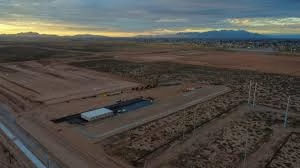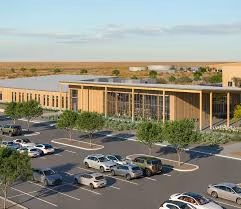Meta Platforms, Inc., the parent company of Facebook and Instagram, today (Oct. 15, 2025) announced it is moving forward with a massive new artificial intelligence (AI) data center in El Paso, marking a $1.5 billion investment in the Texas border city. The groundbreaking for the new facility, Meta’s 29th data center globally, was celebrated at a news conference hosted by the Borderplex Alliance.
The project will rise on a 1,000-acre site in far Northeast El Paso as a hyperscale data center capable of reaching a 1-gigawatt capacity by 2028. This immense power will support the company’s expanding AI operations and handle demanding workloads. The data Center will rank as one of the largest gigwatt sized data centers around the world.
Texas Governor Greg Abbott called the project “an incredible moment for El Paso and for Texas as a whole.” He said it strengthens the state’s leadership in AI and technology. In addition, the project will create about 1,800 construction jobs and around 100 permanent high-paying positions, while also generating new tax revenue for the city. This will be a big win for Texas in the race between US states to attract data center investment.
A new standard for AI infrastructure
The facility is designed to handle both traditional and next-generation AI hardware and will be one of Meta’s major data center developments in the USA. It incorporates advanced environmental features, including a water-free closed-loop liquid cooling system for much of the year. Matching its electricity consumption with 100% renewable energy, and a commitment to restore 200% of the water it uses to local watersheds.
This investment is part of a larger trend of technology companies investing heavily in AI infrastructure. The El Paso project is one of several large data centers Meta is developing.
Local impact and reaction
El Paso Mayor Renard Johnson expressed pride in the city hosting the data center, calling it a “monumental opportunity”. The city’s incentive package for Meta was increased due to rising demand in the AI industry.
While some locals have raised concerns about potential impacts on water and electricity resources and the number of permanent jobs, supporters emphasize the benefits of tax revenue and high-paying jobs. This project further establishes Texas as a major technology hub and El Paso as a destination for significant tech investment.
Additionally, Meta is building on its growing presence in Texas with a new data center in El Paso and a Meta-backed 400 MW solar project underway in Yoakum County.

Meta El Paso AI Data Center: Project Factsheet
Project overview
Company: Meta Platforms, Inc.
Location: 1,000-acre site in Northeast El Paso, Texas, off Stan Roberts Sr. Avenue.
Project type: Hyperscale data center campus optimized for AI workloads.
Investment: $1.5 billion committed for the initial phase of development.
Anticipated completion: 2028.
Key features and specifications
Scale: The campus ranks among the largest in the U.S. and can scale up to a 1-gigawatt power capacity.
Design: The data center features a flexible layout that supports both traditional servers and future generations of AI-enabled hardware.
AI Optimization: Engineers designed the facility to handle the intense and evolving demands of modern AI training and inference.
Sustainability and environment
Renewable energy: The facility will match its electricity use with 100% renewable power.
Water conservation:
It will utilize a closed-loop, liquid-cooled system that continuously recycles water, consuming zero water for much of the year.
Meta has pledged to be “water-positive” and restore twice the amount of water it consumes to local watersheds.
Economic impact
Construction jobs: The project will generate an estimated 1,800 construction positions at the peak of building activity.
Permanent jobs: Once complete, the facility will offer about 100 permanent, high-paying operational roles.
Local incentives: The city of El Paso offered incentives, providing Meta an 80% rebate on the city’s portion of property tax revenue over 25 years for each phase.
Community context
Regional technology hub: This facility solidifies El Paso’s and Texas’s position as a major center for technology investment and AI infrastructure.
Collaboration: The project is a collaboration between Meta and the Borderplex Alliance.
Local response: The project is widely supported for its economic benefits, though some residents worry about water use and job numbers.

Leave a Reply